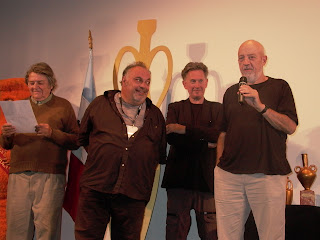The Douglas Hyde Conference 2009, called "Culture and the Economy, Creativity and Innovation in Post Boom Ireland", is taking place 16 - 18 October, in the Abbeyfield Hotel Conference & Leisure Centre in Ballaghaderreen, Co. Roscommon.
Some of the speakers include Martin Cullen, Minister for Arts, Sport & Tourism; Mícheál Ó Súilleabháin, Chairperson, Culture Ireland and Director of Irish World Academy of Music & Dance; Una McCarthy, Head of Festivals, Street Arts & Spectacle, The Arts Council; Sarah Glennie, Director, Irish Film Institute; Garry Hynes, Director, Druid Theatre Company; and Alice Lyons, Poet and Visual Artist
Details on fees and the application process are available on the web site.
Continue Reading...
While creativity is most evident or pronounced within the arts sector, in any sphere it is the characteristic essential to the development of new solutions. The lateral thinking, multiple intelligences and problem solving skills central to the arts and all the creative industries represent the same creative thinking employed in technology, the environment, education or industry - creativity is the quality that allows the next new step to be conceived.
Not only is it important that we continue to value the creative sector, but perhaps now, in the current climate, it is vital that we look to the creative sector and better examine the benefits culture, creativity and innovation can bring to our society, and to our economy.
The Douglas Hyde Conference brings together thinkers, academics, artists and political leaders to investigate the potential of the Creative Economy.
Some of the speakers include Martin Cullen, Minister for Arts, Sport & Tourism; Mícheál Ó Súilleabháin, Chairperson, Culture Ireland and Director of Irish World Academy of Music & Dance; Una McCarthy, Head of Festivals, Street Arts & Spectacle, The Arts Council; Sarah Glennie, Director, Irish Film Institute; Garry Hynes, Director, Druid Theatre Company; and Alice Lyons, Poet and Visual Artist
Details on fees and the application process are available on the web site.






























